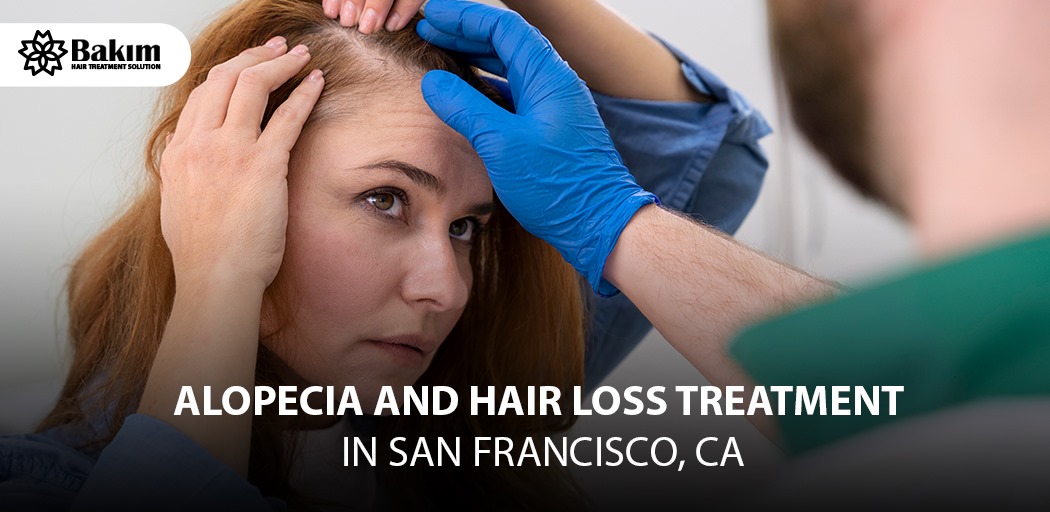Dealing with hair loss can be a daunting experience, but you’re not alone. Many people in San Francisco and around the world face this issue daily. Whether it’s a few strands in the shower or significant thinning, understanding alopecia and the available treatments can help you regain your confidence.
What is Alopecia?
Alopecia refers to hair loss from any part of the body. While it’s most noticeable on the scalp, it can affect other areas too. This condition can result from various factors, including genetics, hormonal changes, medical conditions, and lifestyle choices.
Understanding Hair Loss
Hair loss can occur for many reasons, and understanding the type you have is crucial for effective treatment. Let’s dive into the types of alopecia you might encounter.
Types of Alopecia
Alopecia Areata
Alopecia areata is an autoimmune disorder where the body’s immune system attacks hair follicles, leading to patches of hair loss. It can affect any area of the body and is often unpredictable.
Androgenetic Alopecia
Also known as male or female pattern baldness, androgenetic alopecia is the most common type of hair loss. It’s influenced by genetic and hormonal factors and typically follows a recognizable pattern.
Telogen Effluvium
This type of hair loss occurs when a large number of hair follicles enter the resting phase simultaneously, resulting in significant shedding. Stress, surgery, illness, or nutritional deficiencies often trigger it.
Other Types of Alopecia
There are several other less common types of alopecia, including traction alopecia (caused by hair styling practices), scarring alopecia (where hair follicles are destroyed), and more.
Causes of Hair Loss
Genetic Factors
Genetics play a significant role in hair loss. If your parents experienced hair loss, you might be more likely to face it as well.
Hormonal Changes
Hormonal imbalances, such as those occurring during pregnancy, menopause, or due to thyroid issues, can lead to hair loss.
Medical Conditions
Certain medical conditions like autoimmune diseases, scalp infections, and systemic illnesses can cause hair loss.
Lifestyle and Environmental Factors
Poor diet, stress, lack of sleep, and exposure to pollutants can contribute to hair loss. Maintaining a healthy lifestyle can help mitigate these effects.
Symptoms and Diagnosis
Common Symptoms
Hair loss symptoms can vary. You might notice thinning hair, bald patches, or a receding hairline. In some cases, there might be itching or discomfort.
Diagnostic Procedures
A dermatologist or trichologist can diagnose alopecia through a physical examination, medical history, and sometimes a scalp biopsy or blood tests.
Impact of Alopecia on Mental Health
Hair loss can significantly affect self-esteem and mental health. It’s essential to address these emotional challenges alongside physical treatment. Support groups and therapy can be beneficial.
Treatment Options for Alopecia in San Francisco
Medical Treatments
Topical Treatments
Topical treatments like minoxidil are commonly prescribed to stimulate hair growth and slow down hair loss.
Oral Medications
Oral medications such as finasteride can be effective, especially for androgenetic alopecia. They work by blocking the hormones that cause hair loss.
Surgical Treatments
Hair Transplant
Hair transplants involve moving hair follicles from one part of the scalp to the thinning or bald areas. It’s a long-lasting solution but can be costly.
Scalp Reduction
Scalp reduction surgery removes bald scalp areas, bringing hair-bearing skin closer together. It’s less common but can be effective in specific cases.
Advanced Treatments and Technologies
PRP (Platelet-Rich Plasma) Therapy
PRP therapy involves injecting platelet-rich plasma from your blood into the scalp to promote hair growth and improve hair thickness.
Laser Therapy
Low-level laser therapy (LLLT) uses light energy to stimulate hair follicles and promote growth. It’s a non-invasive and painless treatment option.
Stem Cell Therapy
Stem cell therapy is an emerging treatment that involves using stem cells to regenerate hair follicles and promote growth. It’s still under research but shows promise.
Holistic and Natural Remedies
Dietary Changes
A balanced diet rich in vitamins and minerals can support hair health. Consider incorporating foods high in biotin, zinc, and iron.
Essential Oils
Essential oils like rosemary, peppermint, and lavender have shown potential in promoting hair growth when applied to the scalp.
Stress Management Techniques
Since stress can trigger hair loss, practices like yoga, meditation, and mindfulness can help manage stress levels.
Finding the Right Specialist in San Francisco
Dermatologists
Dermatologists specialize in skin and hair conditions and can provide various treatment options for alopecia.
Trichologists
Trichologists focus specifically on hair and scalp health, offering specialized knowledge and treatments.
Clinics and Hospitals Specializing in Hair Loss
San Francisco has several renowned clinics and hospitals that specialize in hair loss treatments. Research and consultations can help you find the best fit.
Cost of Treatment in San Francisco
Hair loss treatment costs can vary widely based on the type of treatment and the clinic. It’s essential to discuss pricing during your consultation.
Insurance and Payment Options
Some treatments might be covered by insurance, especially if they’re medically necessary. Additionally, many clinics offer payment plans to make treatments more affordable.
Preventive Measures for Hair Loss
Maintaining a Healthy Diet
A nutrient-rich diet supports overall hair health. Ensure you’re getting enough vitamins and minerals to keep your hair strong and healthy.
Proper Hair Care Routine
Gentle hair care practices, such as avoiding harsh chemicals and heat styling, can prevent damage and hair loss.
Avoiding Stress
Chronic stress can lead to hair loss. Finding ways to manage stress through relaxation techniques, hobbies, and adequate rest is crucial.
Living with Alopecia
Support Groups and Communities
Connecting with others who have alopecia can provide emotional support and practical advice. Look for local or online support groups.
Coping Strategies
Developing coping strategies, such as using wigs or hairpieces and focusing on other aspects of your appearance, can help maintain your confidence.
Success Stories from San Francisco
Personal Testimonials
Hearing success stories from others who have undergone treatment can be inspiring. Many individuals in San Francisco have found effective solutions for their hair loss.
Case Studies
Case studies highlight the progress and results of various treatments, providing insight into what might work for you.
Conclusion
Hair loss can be challenging, but numerous treatments are available in San Francisco to help you regain your confidence and improve your hair health. Early consultation with a specialist is crucial to finding the right solution for your needs.
FAQ’s
What is the most effective treatment for alopecia?
The effectiveness of treatment varies by individual and type of alopecia. Consult with a specialist to determine the best approach for you.
Can alopecia be completely cured?
While some types of alopecia can be treated effectively, not all cases can be entirely cured. Treatments often focus on managing symptoms and promoting hair growth.
How long does it take to see results from treatments?
Results can vary depending on the treatment and individual. Some people may see improvements within a few months, while others might take longer.



